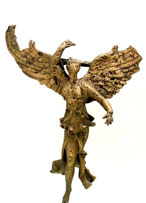| Author | |
|---|---|
| Epoch | died 1737/1738 |
| Work | Putting to rest of our holy father and Bishop of Tsilkani, miracle-worker, who was one of the twelve holy fathers who came from Tigris and Euphrates river valley. Bless us, Father! (Ancient Georgian Hagiographic Literary Works , book V, Tbilisi, 1989 |
| Type | |
| Quote | “… all four elements: air, fire, water and earth, by means of which and among which all that can be felt circulates…” (92, 15-17) |
| Term |

| Comment | “As it can be surmised from Aristotle’s “Metaphysics” (1,3), one of the main goals of the pre-Socrates antique Greek philosophy was revealing of the smallest material parts making up the Universe, i.e. revealing basic original elements. To be more specific, for Thales this was Water, for Anaximenes and Diogenes – Air, and for Hippasus of Metapontum and Heraclitus of Ephesus – Fire. Whatever concerns Empedocles, in his opinion there existed the fourth origin too – Earth, which together with the other three material particles – water, air and fire creates physical phenomena and natural i.e. material objects. This happens namely by means of mixing up all four origins (For details see: S. Tsereteli, Antique Philosophy, Tbilisi, 1968, pg. 136-138). This antique philosophical point of view, stemming from Empedocles’ thoughts, turned out to be fully acceptable for Christian Europe. He gained a firm foothold among the Mediaeval scholastics. The main reason for this was probably the fact that in a number of his works Aristotle had thoroughly discussed the issue of four origins (“Metaphysics”, I: 3,5,8, V:4: “Physics” I: 4,6, II: 1, III: 5; “On the Heavens”, III: 3-7, IV: 3-6; “On Emergence and Disappearance”, II etc.) Philosophical teaching on the four origins was no less popular in ancient Georgia too. Namely, it can be found in Rustaveli’s “The Knight in Panther’s Skin” (Comp. E. Khintibidze, Medieval and Renaissance Elements in “The Knight in Panther’s Skin”, Tbilisi, 1993, pg, 95-96). As it is clear from the provided glossary, other representatives of ancient Georgian writing are also familiar with Empedocles’ opinion on the four origins [Z.Kh.] |
|---|

